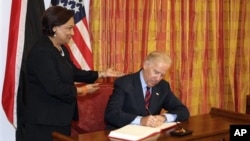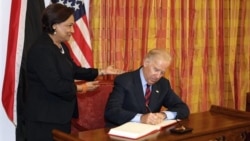Speaking in Trinidad and Tobago at a meeting with 15 presidents, prime ministers, and other senior ministry officials from the Caribbean region, U.S. Vice President Joe Biden reaffirmed the United States' commitment to deepening economic collaboration and expanding prosperity and social inclusion in the region.
“Island nations face special difficulties” in building up their economies, said Vice President Biden. “The cost of doing business can be higher. Goods are more expensive.”
"We know our chances of success increase not only if the nations of the Caribbean work together, but also if the United States works in concert with them," the Vice President said.
“And so through [the] Caribbean Basin Initiative, we've eliminated tariffs on 85 percent of [Caribbean-manufactured] goods, and now we're looking for additional ways to help create growth and diversity in the economies within the Caribbean.”
Vice President Biden and President Michel Martelly of Haiti, who currently serves as Chair of the Caribbean Community, took another step toward deepening economic cooperation by signing the U.S.–Caribbean Community Trade and Investment Framework Agreement, or TIFA. TIFA will provide a strategic framework and principles for dialogue on trade and investment issues of mutual interest.
The leaders also discussed citizen security cooperation and the importance of building safe communities that contribute to a favorable business and investment climate.
They committed to working together to build strong, capable and transparent institutions; facilitate trade and create favorable business and investment climates; expand access to reliable, clean, and affordable energy; and invest in human capital so that citizens are prepared to contribute to the development of their communities.
As Mr. Biden said, “There’s probably no group of nations better situated to take advantage of renewable energy possibilities than here in the Caribbean. The United States and many other countries are looking to invest in connected regional grids to create economies of scale that are driven by renewable energy.”
“Our goal is not simply growth, but it’s growth that reaches everybody,” said Vice President Biden.
“We have a lot of work to do, and we are anxious to work with you.”
“Island nations face special difficulties” in building up their economies, said Vice President Biden. “The cost of doing business can be higher. Goods are more expensive.”
"We know our chances of success increase not only if the nations of the Caribbean work together, but also if the United States works in concert with them," the Vice President said.
“And so through [the] Caribbean Basin Initiative, we've eliminated tariffs on 85 percent of [Caribbean-manufactured] goods, and now we're looking for additional ways to help create growth and diversity in the economies within the Caribbean.”
The United States and many other countries are looking to invest in connected regional grids to create economies of scale that are driven by renewable energy.”
The leaders also discussed citizen security cooperation and the importance of building safe communities that contribute to a favorable business and investment climate.
They committed to working together to build strong, capable and transparent institutions; facilitate trade and create favorable business and investment climates; expand access to reliable, clean, and affordable energy; and invest in human capital so that citizens are prepared to contribute to the development of their communities.
As Mr. Biden said, “There’s probably no group of nations better situated to take advantage of renewable energy possibilities than here in the Caribbean. The United States and many other countries are looking to invest in connected regional grids to create economies of scale that are driven by renewable energy.”
“Our goal is not simply growth, but it’s growth that reaches everybody,” said Vice President Biden.
“We have a lot of work to do, and we are anxious to work with you.”






